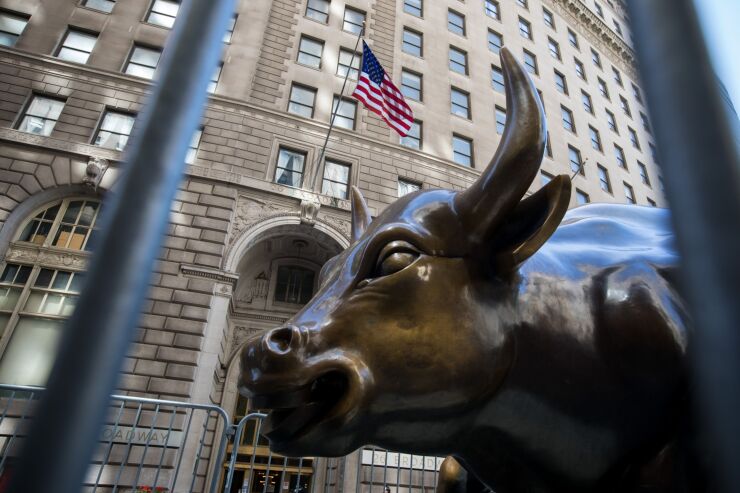SPACs, direct listings, traditional IPOs. No matter how companies have made the switch from private to public markets, they’ve been met with exuberance.
The market for newly minted stocks has exploded this year, with U.S. initial public offerings raising more than $80 billion so far, surpassing prior highs from the dot-com era, according to Bespoke Investment Group. An exchange-traded fund of recently listed companies has surged 67%, far outpacing the broader market. And the third-quarter deal count has been the busiest since 2000, according to Renaissance Capital.
The unprecedented success private companies have had raising money through a stock listing is straightforwardly a good sign for a functioning financial system. It’s also ostensibly the equity market’s primary function, one that had been largely usurped by private markets in recent years. That changed in 2020, when the pandemic upended the economy and stimulus sparked a massive rally. To bears, the can’t-miss nature of the latest listing glut is a symbol of froth in a market where stretched valuations already draw internet-era comparisons.
“There is too much risk — the success feeds on itself, people remember the last IPO, they want to get into the next one,” said Christopher Grisanti, chief equity strategist at MAI Capital Management. “It’s a symptom of folks looking and grasping for growth in a slow economy.”
Part of the enthusiasm that’s driven first-day gains in the likes of Snowflake and JFrog owes to a widening hunt for returns in financial markets where bonds pay virtually nothing and commodities have been under pressure all year.
The latest IPO darling is Palantir Technologies. Peter Thiel’s company surged Wednesday after going public through a direct listing, a newly embraced method where
The flurry caps the busiest month on record for IPOs on the New York Stock Exchange. October is also shaping up to be be a blockbuster for listings, Stacey Cunningham, president of the exchange, told Bloomberg TV in an interview.
Airbnb and DoorDash are among those poised to debut in the coming months.
Though the year has been challenging given the pandemic and economic downturn, “it changed the dynamics around the cost of capital in the private markets versus the public markets so we’re seeing a lot of companies looking to tap into the public markets as they’re uncertain about what the future might bring,” Cunningham said. “That’s not a trend we see slowing down.”
Cloud software company Snowflake
To Paul Nolte, a portfolio manager at Kingsview Investment Management in Chicago, such exuberance warrants caution.
“You take a look at how they trade, their overall revenue, their lack of earnings and to see the reaction on the first day of trading or the first week of trading is very similar to what we saw in 1999, 2000,” said Nolte in a phone interview. “All they have to say is, ‘We’re in the cloud, we’ve got cloud solutions,’ and all of a sudden they get a bazillion valuation on it. Similar to, ‘I’m on the internet, I have dot-com after my name,’ in ‘99. Oh, well, you’re worth so much more.”
Still, the overall market-cap of newly issued stocks is much smaller compared with two decades ago, according to Bespoke. This year, IPOs make up about 0.24% of the Russell 3000 market-cap, compared with 0.37% for the equivalent period in 2000.
But investing in the Renaissance IPO ETF at the start of the year would have yielded returns of about 67%. The fund, whose top holdings include Zoom Video Communications and Uber Technologies, is besting one tracking the S&P 500 for the sixth straight month, the longest such streak on record.
Much of the money raised this year is courtesy of the tech sector. Technology firms have raised more than $12 billion of the $102 billion total raised on U.S. exchanges this year, according to data compiled by Bloomberg.
“How many IPOs have come this year that are industrial companies or banks or some old economy business? Very few,” said Michael Purves, chief executive officer of Tallbacken Capital Advisors LP. “The question of how value is defined is increasingly obvious in an age of rapid disintermediation by digitally based business models. This is an era when Warren Buffett is buying Snowflake.”
--With assistance from Claire Ballentine, Katherine Greifeld, Lu Wang and Sarah Ponczek.






